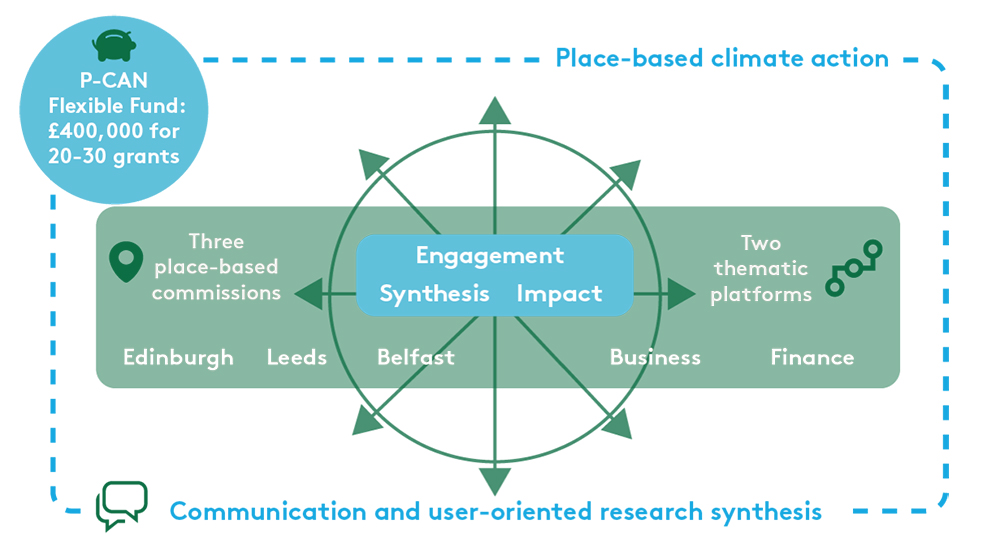Downloads
The Place-Based Climate Action Network (PCAN) developed a model for local interventions and organisation on climate issues, as well as providing funding, research and knowledge exchange to support climate localism in the UK.
Challenge
Climate change is a global problem with local impacts. However, policy responses are typically formulated at the national and international level and enacted in 'top-down' or centre-to-periphery models of evidence gathering and governance.
This can limit the ability of local communities to identify and respond to their own climate impacts and risks. A more localised approach to understanding and mitigating climate risk could leverage the relevant local knowledge of citizens and communities, improving local responses to climate change.
Solution
A multi-disciplinary team including geographer Dr Candice Howarth (LSE) established the Place-Based Climate Action Network (PCAN) in 2019. The network links researchers with local communities to facilitate local action with multiple stakeholders on climate change and help the UK meet its climate change obligations.
PCAN established three local Climate Commissions in Belfast, Edinburgh and Leeds and helps facilitate their work and organisation.
These are independent local bodies which bring people and organisations together to work on climate action. The Commissions have a number of roles, including evidence-gathering; climate action planning; and supporting partnerships between local actors and local government to promote climate action.
PCAN has created guidance for new commissions, including a web template and support on developing carbon roadmaps. The aim is to produce a replicable model of local climate action and governance to drive place-based climate policy across scales and places.
To underpin future work, PCAN has also established a fund to stimulate engagement in place-based action with grants to researchers and research users. This enables projects in place-based climate action, and in 2020 funded three fellowships and three projects focusing on place-based climate resilience and climate policy.
PCAN's network schematic (credit: PCAN)
Benefits
Policy insight
The PCAN Climate Commissions have helped engage local citizens and governance in climate policy debates, and adapt climate governance to emerging geographies of city region governance:
-
The Leeds Climate Commission presented a 2019 Leeds Carbon Roadmap to the City Council which included a carbon budget for Leeds to define a path to net zero for the city. The Leeds CC has also released position papers on potential carbon emissions reduction measures an established a Climate Change Citizens' Jury whose feedback has informed Leeds City Council's Climate Emergency Update report in 2020.
-
The Edinburgh Climate Commission have produced recommendations for local green recovery measures post-COVID, and in Belfast the Commission has undertaken knowledge exchange including local and devolved government stakeholders to share ideas towards a just transition.
-
In Belfast, the local Commission has undertaken research to map community climate action with the aim of identifying opportunities for future partnerships on climate action with communities.
Beyond the Climate Commission activities, the PCAN team’s research has identified evidence gaps around local impacts and vulnerabilities, and highlighted the need for diverse approaches, scales and sources to inform policy.
PCAN’s research has also led to the creation of 'carbon roadmaps', identifying over 130 energy-saving options for communities in Yorkshire and the Humber, and has improved approaches to climate messaging by highlighting the need for academics to engage local media in climate narratives. PCAN also drives work on finance, business engagement and adaptation through its innovative, cross-cutting thematic platforms.
Building capability
The reproducible model and support structure of PCAN has been proven with a number of new climate commissions founded in 2019 and 2020. The new commissions are located in Surrey, Croydon, Lincoln, Essex and Doncaster.
These new commissions are already contributing to climate action and climate policy discussions. Doncaster Commission released its report on tackling the climate crisis in December 2020; Essex Commission has also released an initial report with recommendations for key sectors. Surrey Commission is undertaking a baseline study against which future climate risk assessment activities can be undertaken.
Additionally, as part of its work to enable local climate action the PCAN Fund offers local projects opportunities to bid for support. Six projects and fellowships were funded in 2020, disbursing £160,000 on work including:
-
Sharing regional expertise in Somerset to address the 'risk gap' between planning processes and climate risk guidelines.
-
Developing effective climate policy across multiple local authorities in Surrey
-
Creating a model of sustainable 'community wealth building' in Preston
The funding aims to stimulate wider engagement with place-based climate action and extend PCAN’s work to more communities and places.
Sharing data
PCAN initiatives are encouraged to publish climate evidence and data in accessible ways for a range of audiences. For example, the Leeds Commission has created an accessible Climate Resilience Database to share data and information on climate resilience, and have held public engagement events to gauge views on climate action in Leeds.
Improving public understanding
Knowledge exchange events have included hosting a mini-conference on praxis in climate governance (with the Royal Geographical Society (with IBG) Climate Change Research Group), a workshop on citizen juries and assemblies on climate change, and a roundtable discussion on the effectiveness of climate emergency declarations, and a launch event for the imminent report on Trends in local climate action. PCAN also runs a range of webinars that that share expertise to help local authorities, communities and individuals reduce their climate impact.
PCAN’s map of place-based climate action in the UK allows users to understand the financial and carbon costs of energy consumption in their local area.
Further reading
Read commentaries from the team on the work of PCAN
Share this resource
This is an open access article under the terms of the Creative Commons Attribution License (CC BY NC 4.0), which permits use, adaptation, distribution and reproduction in any medium or format, provided the original work is cited and it is for non-commercial purposes. Please contact us for other uses.
How to cite
Royal Geographical Society (with IBG) (2021) Developing models of governance and praxis for local climate action. Available at www.rgs.org/PCAN Last accessed on: <date>


